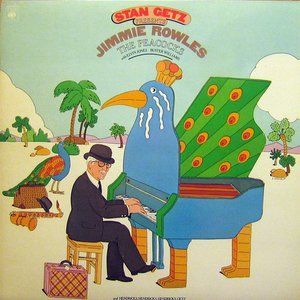Though Stan Getz is credited as the leader of The Peacocks, and his immediately identifiable tenor saxophone is well represented, this session is actually headed by pianist and vocalist Jimmy Rowles, with Getz as producer. It is essentially a series of laid-back duets between Rowles and Getz, or a small amount of quartet recordings complemented by bassist Buster Williams and drummer Elvin Jones. The range of emotion and dynamics presented offers a unique listening experience for anyone not particularly familiar with the veteran Los Angeles based Rowles, supported by a variety of players who fully understand his muse. Not without his own innate sense of style, rhythm, and energy, Rowles is the centerpiece in a stack of standards, music of Duke Ellington, modern jazz compositions, and one original. He has a dry vocal style cum Mose Allison or even Tony Bennett, most evident on "I'll Never Be the Same" or the reserved but heartfelt blues ballad/waltz "My Buddy." Without singing, Rowles and Getz sail through the stride flavored Ellington evergreen "What Am I Here For?" and the elegant "Serenade in Sweden," while the title track is the haute cuisine piece, a Rowles original that languishes in pensive, dark and midnight slow liquid colors. Of the ensemble pieces, Wayne Shorter's "Lester Left Town" brims with fermented bubbles, as Getz glides through the melody with a restrained Jones and perky piano from Rowles. A song of slow lingering and reflection on the passing of youth, "This Is All I Ask" is an old man's refrain, fondly remembering bygone glory with a request for one final chance. The stand-out track, completely set apart from the rest, is "The Chess Players," a devilish genius word play set to Wayne Shorter's instrumental melody by Jon Hendricks, featuring the lyricist, family members, wife Judith and daughter Michelle, and Getz's wife Beverly. It's a killer song, rousingly upbeat and wild, as the chorale threatens they're "coming to get you," "you better believe it," and they "must have your love." Rowles does a modified free solo piano adaptation of "Body & Soul," and an interesting medley of Cedar Walton's modal "Mosaic" affixed to a short snippet of "Would You Like to Take a Walk?" as an appropriate coda for this program. With few Jimmy Rowles recordings in the world, this has to rank as his best, clearly the most entertaining, and a project Getz was ever proud to bring to the jazz world. It is definitive, deserving of the Columbia Jazz Masterpieces tag, and a must-have item in your modern jazz collection. ~ Michael G. Nastos
Tracks
1
I’ll Never Be the Same
04:07
2
Lester Left Town
05:54
3
Body and Soul
05:53
4
What Am I Here For?
04:57
5
Serenade to Sweden
05:40
6
The Chess Players
05:44
7
The Peacocks
05:43
8
My Buddy
04:28
9
The Hour of Parting
03:35
10
Rose Marie
02:54
11
This Is All I Ask
04:24
12
Skylark
04:03
13
Mosaic / Would You Like to Take a Walk
01:32
